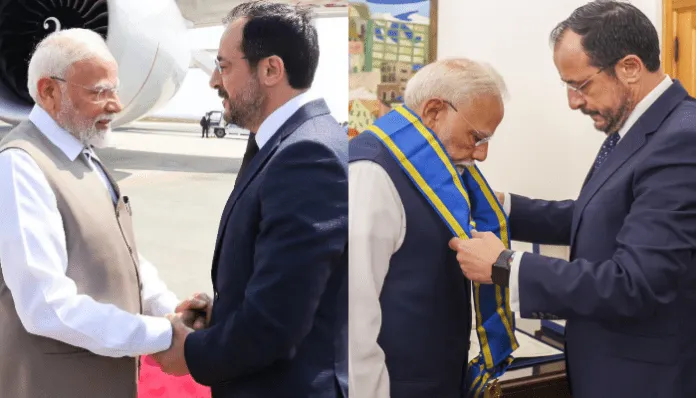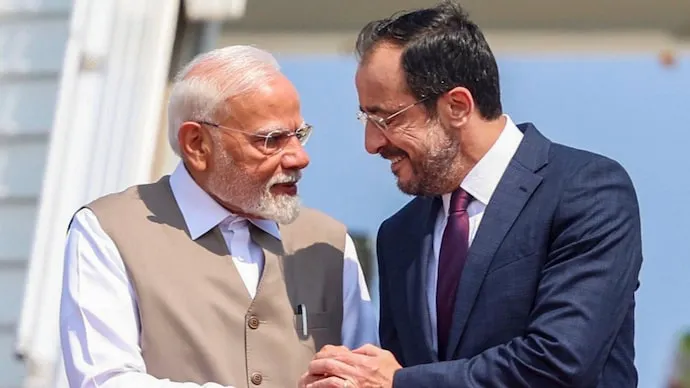Historic Arrival in Cyprus
Prime Minister Narendra Modi embarked on a two day state visit to Cyprus from June 15 to 16, 2025, marking the first Indian Prime Ministerial visit to the island nation in over two decades, only two such visits to Cyprus have taken place in the past 40 years, by Indira Gandhi in 1982 and Atal Bihari Vajpayee in 2002. Modi was received with ceremonial honors at Larnaca International Airport and later welcomed at the Presidential Palace in Nicosia by President Nikos Christodoulides. The visit symbolized a major diplomatic milestone in India-Cyprus relations. Modi was also greeted by members of the Indian diaspora in Limassol, showcasing the close cultural ties between the two countries.

/*Strengthening Diplomatic and Economic Cooperation*/
During his meetings with President Christodoulides, Prime Minister Modi emphasized expanding cooperation in key sectors such as trade, investment, technology, and clean energy. At a business roundtable in Limassol, he underscored the country's accelerating economic potential and invited Cypriot investors to participate in its development. He projected that the nation is on course to become the world’s third-largest economy, citing reforms that have significantly enhanced its ease of doing business ranking. A key outcome of the visit was the joint reaffirmation of support for the India–Middle East–Europe Economic Corridor (IMEC), with Cyprus positioned as a strategic gateway to the European market.
/*Defense, Maritime, and Cybersecurity Cooperation*/
Both nations agreed to enhance defense and maritime security ties, with a joint declaration focusing on defense collaboration, anti-terror strategies, and cybersecurity. Modi highlighted shared interests in the Indo-Mediterranean region and reinforced India’s support for peaceful resolution in global conflicts. In a symbolic diplomatic gesture, India reiterated its support for Cyprus amid its ongoing territorial dispute with Turkey. Cyprus has a long-standing conflict with Turkey, stemming from the 1974 Turkish invasion and the ongoing division of the island. Turkey’s recognition only of the Turkish Republic of Northern Cyprus (TRNC) contrasts with Cyprus’s EU membership and its Western alliances. By visiting Cyprus and potentially touring the UN-controlled buffer zone (Green Line), PM Modi is sending a clear message of solidarity with Cyprus against Turkish expansionism, further consolidating the nations’ strategic alignment.
/*Honor and Cultural Recognition*/
In recognition of his contribution to strengthening bilateral relations, Prime Minister Modi was conferred with Cyprus's highest civilian honor—the Grand Cross of the Order of Makarios III—by President Christodoulides. Modi dedicated this award to the people of India and the enduring friendship between the two countries. A notable moment during a public event in Nicosia saw a Cypriot council member touching Modi’s feet, a touching act of cultural respect that drew widespread attention in Indian media.
/*Key Policy and Strategic Messages*/
During his speeches, PM Modi reiterated India’s global stance of “this is not an era of war”, calling for peaceful diplomacy in West Asia amid ongoing regional tensions. He expressed optimism about concluding the India–EU Free Trade Agreement by the end of 2025, with Cyprus pledging its full support as it prepares for its EU presidency in 2026. He underscored Cyprus’s role as a bridge to Europe and emphasized deeper cooperation in regional infrastructure and trade.
/*Key Highlights of the MoU*/
An MoU was signed between NPCI (India) and Eurobank (Cyprus) to introduce the UPI payment system in Cyprus. This will enable both Indian and Cypriot tourists and business users to make seamless cross-border payments. This move shows Cyprus as the second European country, after France, to adopt UPI services. The MoU was announced during a major business roundtable held in Limassol, co-chaired by Prime Minister Narendra Modi and Cyprus President Nikos Christodoulides. The roundtable was attended by leading business figures from sectors like banking, manufacturing, defence, logistics, shipping, digital technology, AI, mobility, and tourism.
/*Objectives and Benefits. */
Indian UPI users will be able to make direct payments in Cyprus without currency exchange, benefiting both tourists and small businesses.
/*Lower Transaction Costs*/:Compared to traditional banking systems, this system enables faster and cheaper transactions.
/*Entry into the European Market*/:Given Cyprus’s strategic location, this MoU could be the first step for UPI's expansion into the European and Mediterranean regions.
/*Remarks by PM Modi and President Christodoulides*/
PM Modi described digital payments, startups, and innovation as engines of global growth and highlighted this MoU as a milestone in strengthening economic cooperation.
President Christodoulides called the move a gateway to new economic opportunities between Cyprus and India, especially in trade, investment, and financial inclusion.
/*Future Prospects*/
With the help of the UPI framework, Cyprus can begin accepting UPI-based digital payments globally, supporting regional financial integration.
This was also part of the launch of a trilateral council (India-Greece-Cyprus Business and Investment Council), aimed at deepening cooperation in shipping, aviation, logistics, and digital services.
/*Departure and Broader Diplomatic Tour*/
Following his Cyprus engagements, PM Modi departed for Canada to attend the G7 Summit (June 16–17) and was scheduled to visit Croatia on June 18, before returning to India on June 19. The Cyprus visit stood out as a strong signal of India’s expanding diplomatic influence in the Mediterranean and Europe.
PM Modi’s visit to Cyprus was not only historic but also strategically vital. It reinvigorated bilateral relations, advanced defense and economic partnerships, and signaled India’s intent to strengthen ties with the European Union. The trip showcased India’s growing global profile and its balanced, principled stance on international issues, particularly those concerning peace, trade, and security.
